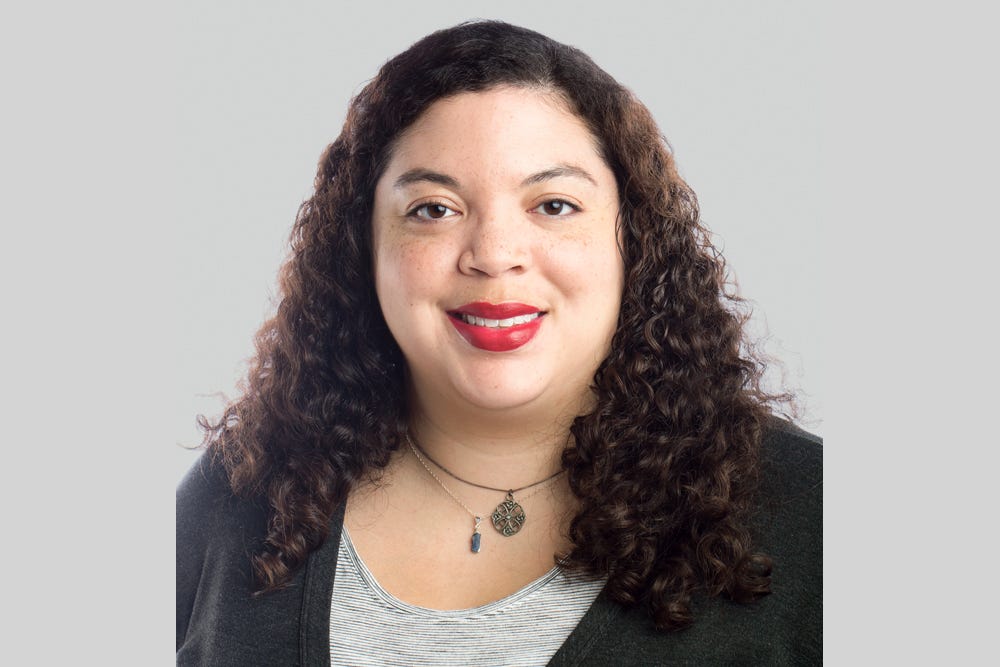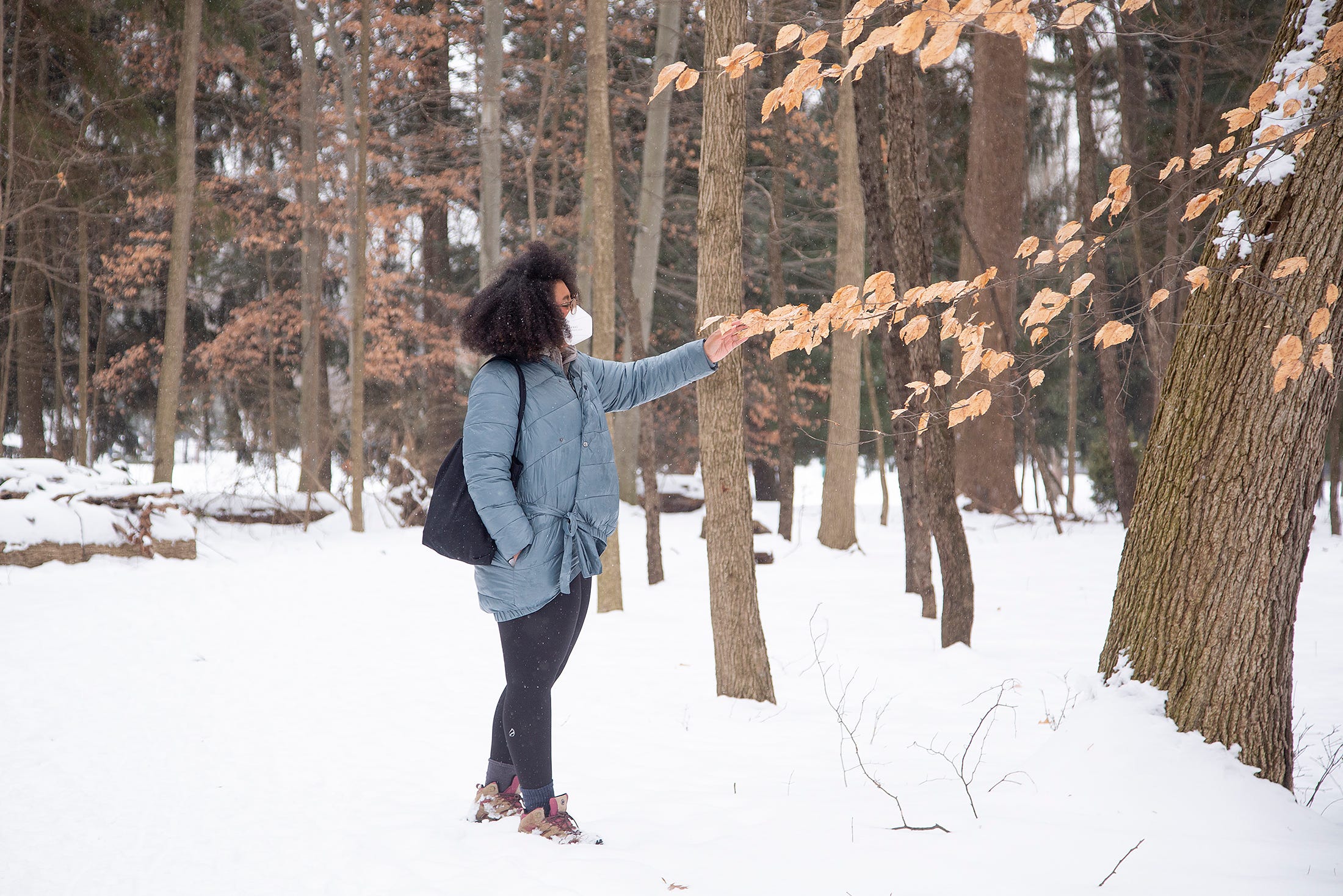Alexis Nikole Nelson wants you to go outside
The forager is using social media to spread the gospel of wild food — and it’s working.
 Brittany Moseley
Brittany Moseley
Alexis Nikole Nelson is fond of saying she’s been eating food off of the ground since she was a kid. While it sounds like a funny “kids do the darndest things” moment, it’s true in Nelson’s case. And she remembers her first experience with wild food clearly.
She was 5 years old, running around her mom’s garden in Cincinnati with her “tiny trowel, digging in the dirt,” when her mom introduced her to onion grass. The grass, which grows in tall, thin tubes, is considered an invasive weed — and also an edible one. It has a distinct onion smell and is similar in look and taste to chives.
“For some reason, that stuck,” Nelson said of her first lesson in foraging 101. “None of the other really cool organized gardening things really stuck. I was like, 'No, I want to find more of these accident[ally] tasty plants.' ”
Foraging became a larger part of Nelson’s life out of necessity. After graduating from Ohio State in 2015, Nelson was “super broke.” She quickly realized if she wanted to incorporate anything leafy and green into her diet, it was going to be food she found for free. So she did her homework and began using the app Falling Fruit, which allows people to mark and share fruit-bearing trees in their neighborhoods. She got creative with the edible plants she already knew about and found new ways to use them. She researched foraging laws and pollution’s effect on wild food.
“That somehow has snowballed and spiraled into seaweed panna cotta,” Nelson said.
Things really began to snowball for Nelson when the COVID-19 pandemic hit Ohio last March. At that time, her foraging Instagram account (@blackforager) was less than a year old and had about 800 followers. In January 2020 she started a TikTok account, but she wasn’t posting any foraging content to it. She started the account because BARK — where she works as the social media marketing manager — was interested in creating a TikTok. Nelson figured she would try the platform for herself before creating one for her workplace.
When she started her account, Nelson did all the usual TikTok trends. “I learned the Renegade, which no almost 30-year-old has any business learning,” she said. “I was using all of the trending sounds, but I was always feeling like I was running behind what was going on in the app.”
Then the shutdown happened and something as routine as going to the grocery store became a much bigger deal. So Nelson made a video about edible plants you could forage in your neighborhood. “[It was] super rudimentary [and] not edited together in the best way. ... I posted it, and I didn't think anything of it,” Nelson said. “I opened the app the next day and it had like 40,000 views.”
Suddenly, this small, niche community Nelson belonged too had a much wider audience.
"This is what the kids want?” Nelson said of her initial reaction to her sudden popularity. “They don't want my outfits? They don't want me dancing like an idiot? They just want me geeking out about the things I geek out about?”
Within a month of posting her first foraging videos, Nelson said her TikTok follower count doubled and people began funneling into her Instagram account. She expected to top out at 5,000 followers. Today, she has more than 484,000 followers on TikTok and more than 173,000 on Instagram.
The appeal of Nelson’s videos is as easy to spot as onion grass. For one, she’s funny as hell. The “occasional professional comedian” loves reminding people that she’s a filthy vegan. She is known to burst into song in many of her videos, whether she’s writing an ode to the much-maligned cattail, showing you how to make pine cookies or asking you very nicely to stop pulling ramps up by their roots, which she does in a rap that would make Lin-Manuel Miranda proud.

Nelson is approachable, which in turn makes foraging — a hobby that can seem intimidating to newbies — seem palatable. She offers her followers recipes, book recommendations and history lessons with ease and warmth.
In a recent TikTok video, Nelson discussed the intersection of race and foraging and its long history among Black people, Native Americans and poor rural populations. Those groups are also the ones who are most often hurt by anti-foraging laws.
“The history of early American anti-foraging laws reveals that supporters of restricting foraging rights typically grounded their efforts in racism, classism, colonialism, imperialism, or some combination of these odious practices and beliefs,” Baylen J. Linnekin wrote in a 2018 paper from the Fordham Urban Law Journal.
Linnekin goes on to note that after the Civil War, Southern states enacted criminal trespassing laws which “sought to prohibit the freed slaves from continuing their subsistence foraging practices as a tool to chain freed men to plantation work.”
He sums up the current state of foraging in the U.S. with this: “Anti-foraging laws trace their origins to contempt for the rights of those deemed by those in power to be ‘other’: Native Americans, African Americans, and rural white farmers. Modern foraging regulations, intentionally or not, are built upon this foundation.”
As a Black woman in a predominantly white space, Nelson sees foraging as an act of resistance. She is reclaiming an activity that was taken from her ancestors. She hopes to break down some of the barriers that keep Black people from outdoor spaces.
“Being able to show anyone who looks like me that we do have the right to be reclaiming those spaces, that we do have the right to not only be there but to be seen, to be allowed, to be participating in activities on those spaces, for me, is really, really important,” she said.
“That's an aspect of wellness that a lot of Black communities are left out of,” Nelson said, referring to the benefits of spending time outside. “Anything that I can do to speak to why that's not OK and how we can slowly start shifting this cultural identity that organizes us separately from folks who spend a lot of time outside is a dream.”